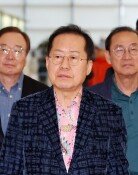Court Finds Kim Woo-jung Not Liable for Damages
Court Finds Kim Woo-jung Not Liable for Damages
Posted July. 04, 2005 03:12,
A court has found Kim Woo-jung, the former owner of Daewoo Corp., not guilty for the firms illicit lending through accounting fraud, citing that he was not a director and thus not responsible for damages.
The Seoul Central District Courts civil case division (chief justice Park Jeong-heon) announced on July 3 that it ruled in favor of Chohung Bank on July 1, which filed for damages of 4.9 billion won against 17 former staff and executives of Daewoo, including Kim, saying, Their false financial statements made us purchase Daewoo corporate bonds and suffer losses. The trial chamber made seven of the defendants pay 500 million won in compensation.
However, the chamber stated, Kim bears no responsibility under commercial law since he was not registered as director of Daewoo at the time of the fraudulent accounting in 1997, adding, Kim is not subject to the commercial law enacted in December 1998 which requires shadow directors of liability for damages, either.
In September 1998, Chohung Bank lost money on the purchase of Daewoos corporate bonds worth five billion won issued based on 1997 financial statements. The bank filed a lawsuit against Kim and others in December 2002.
The chamber noted, Although the fraudulent accounting of defendants caused losses to the plaintiffs, the plaintiffs cannot be compensated as the statute of limitations (three years) for damages has expired under civil law.
In other words, the statute of limitations became ineffective when Chohung Bank filed the suit because the financial authorities had released intermediary due diligence results on Daewoo Group in November 1999.
The chamber demanded seven directors pay 500 million won in compensation by applying the provision of liability for illegal activity of directors against a third party defined in Article 401 of the commercial law and ruled, Corporate directors are liable for damages claimed by a third party on grounds of their malicious intentions or negligence.
In this case, a 10-year statute of limitations set for bonds by regular courts is applicable as there are no specific limitations for third party compensation claims against directors illegal behavior.
In response to Chohung Banks claim that said, Daewoo foreign branches sent the bank repayment to Daewoo by way of the BFC (the Daewoo Groups clandestine foreign financial organization), the chamber dismissed it by saying, It is difficult to see that Daewoo failed to repay the loans because foreign branches sent money to BFC.
woogija@donga.com







